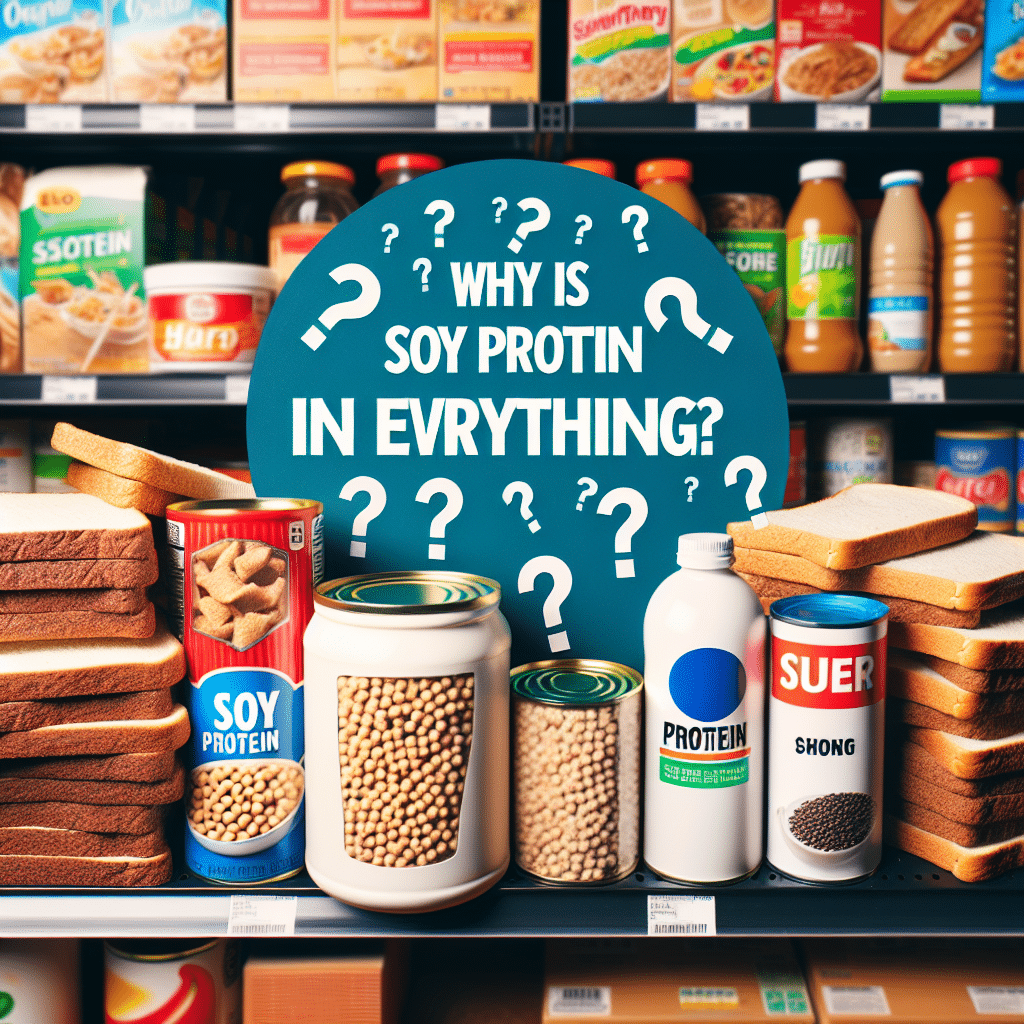Why Is Soy Protein In Everything?
-
Table of Contents
- Soy Protein Proliferation: Understanding Its Ubiquity in Food Products
- The Nutritional Appeal of Soy Protein
- Economic Advantages of Soy Protein
- Consumer Demand for Plant-Based Products
- Environmental Considerations
- Case Studies and Examples
- Challenges and Controversies
- Conclusion: The Future of Soy Protein
- Discover ETprotein’s High-Quality Soy Protein Products
Soy Protein Proliferation: Understanding Its Ubiquity in Food Products

Soy protein has become a staple ingredient in a wide array of food products, from dairy alternatives to meat substitutes, and even in snacks and energy bars. Its prevalence in the food industry is no accident; it is the result of a combination of nutritional benefits, economic considerations, and consumer demand for plant-based options. In this article, we will explore the reasons behind soy protein’s omnipresence in our food supply, supported by examples, case studies, and statistics.
The Nutritional Appeal of Soy Protein
Soy protein is a complete protein, meaning it contains all nine essential amino acids necessary for human health. This makes it a valuable protein source, especially for vegetarians and vegans. The nutritional profile of soy protein includes:
- High-quality protein content comparable to animal protein
- Low in saturated fat and cholesterol-free
- Contains isoflavones, compounds associated with various health benefits
- Rich in vitamins and minerals such as B-vitamins, iron, and calcium
These attributes have led to soy protein being endorsed by health organizations and incorporated into various dietary guidelines.
Economic Advantages of Soy Protein
The widespread use of soy protein can also be attributed to its cost-effectiveness. Soybeans are a high-yield crop, which means they can produce a significant amount of protein per acre of land. This efficiency translates into lower costs for manufacturers and, ultimately, consumers. Additionally, soy protein can be easily extracted and processed into different forms, such as isolates, concentrates, and textured soy protein, making it versatile for various applications.
Consumer Demand for Plant-Based Products
There has been a significant shift in consumer preferences towards plant-based diets, driven by health concerns, environmental awareness, and ethical considerations regarding animal welfare. Soy protein has been a beneficiary of this trend, as it serves as an excellent alternative to animal-based proteins. The rise in popularity of vegetarianism and veganism has further propelled the demand for soy protein-infused products.
Environmental Considerations
Compared to animal protein production, soy protein is associated with a lower environmental footprint. It requires less water, land, and energy and generates fewer greenhouse gas emissions. This sustainability aspect has made soy protein an attractive option for both consumers and companies aiming to reduce their environmental impact.
Case Studies and Examples
Several case studies highlight the successful integration of soy protein into mainstream products. For instance, the rise of plant-based meat alternatives like Beyond Meat and Impossible Foods showcases how soy protein can mimic the texture and taste of animal protein. These companies have experienced explosive growth, indicating a robust market for soy-based products.
Moreover, the dairy alternative sector, with products like soy milk, yogurt, and cheese, has seen substantial growth. According to market research, the global dairy alternatives market is expected to reach billions of dollars in the coming years, with soy-based products holding a significant share.
Challenges and Controversies
Despite its benefits, soy protein’s dominance in the food industry is not without challenges. Concerns over genetically modified organisms (GMOs), as most soybeans grown are genetically modified, have led to a push for non-GMO and organic soy products. Additionally, there are ongoing debates about the health implications of isoflavones and their potential impact on hormone levels.
Conclusion: The Future of Soy Protein
Soy protein’s presence in a wide range of food products is a result of its nutritional value, economic benefits, consumer demand for plant-based options, and environmental sustainability. As the global population continues to grow and the shift towards plant-based diets accelerates, soy protein is likely to remain a key player in the food industry. However, it will be important for producers and consumers to navigate the challenges and controversies surrounding soy to ensure its continued success.
Discover ETprotein’s High-Quality Soy Protein Products
If you’re looking for top-notch soy protein products, ETprotein is your go-to source. Their extensive range of organic bulk vegan proteins, including soy protein, is characterized by a neutral taste, non-GMO, and allergen-free attributes. With purity levels exceeding industry standards, ETprotein caters to various industries, from nutraceuticals to food and beverage. For those seeking sustainable and high-quality protein solutions, ETprotein’s offerings are worth exploring.
About ETprotein:
ETprotein, a reputable protein and L-(+)-Ergothioneine (EGT) Chinese factory manufacturer and supplier, is renowned for producing, stocking, exporting, and delivering the highest quality organic bulk vegan proteins and L-(+)-Ergothioneine. They include Organic rice protein, clear rice protein, pea protein, clear pea protein, watermelon seed protein, pumpkin seed protein, sunflower seed protein, mung bean protein, peanut protein, and L-(+)-Ergothioneine EGT Pharmaceutical grade, L-(+)-Ergothioneine EGT food grade, L-(+)-Ergothioneine EGT cosmetic grade, L-(+)-Ergothioneine EGT reference grade and L-(+)-Ergothioneine EGT standard. Their offerings, characterized by a neutral taste, non-GMO, allergen-free attributes, with L-(+)-Ergothioneine purity over 98%, 99%, cater to a diverse range of industries. They serve nutraceutical, pharmaceutical, cosmeceutical, veterinary, as well as food and beverage finished product distributors, traders, and manufacturers across Europe, USA, Canada, Australia, Thailand, Japan, Korea, Brazil, and Chile, among others.
ETprotein specialization includes exporting and delivering tailor-made protein powder and finished nutritional supplements. Their extensive product range covers sectors like Food and Beverage, Sports Nutrition, Weight Management, Dietary Supplements, Health and Wellness Products, and Infant Formula, ensuring comprehensive solutions to meet all your protein needs.
As a trusted company by leading global food and beverage brands and Fortune 500 companies, ETprotein reinforces China’s reputation in the global arena. For more information or to sample their products, please contact them and email sales(at)ETprotein.com today.












